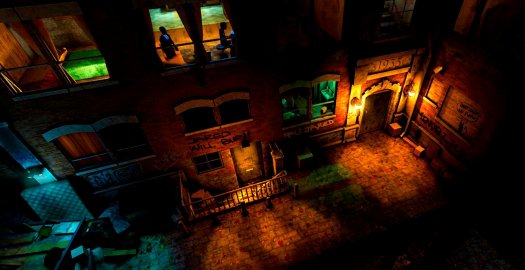Review for Fire Escape

I’ve had the opportunity to play a lot of adventure games featuring serious themes and depictions of crimes. The best of these games generally succeed by accentuating their somber nature with the details necessary to tell a plausibly bleak story. New York developer iNK Stories’ Fire Escape, a very short mystery game designed for VR platforms but now playable on PC with mouse and keyboard, is a serious adventure with dark themes—but its appeal is its total lack of plausibility and a delightful embrace of its own melodramatic insanity.
The game takes place in a Brooklyn neighborhood, beginning at 8:00pm on the October night of a super blood moon. The scene is an apartment building, four stories high. Within the individual apartments, residents go about their evening business. The ambient city noise surrounds you, including motorists honking their horns and yelling at each other. The building’s super is attempting to wash graffiti off of the front entrance while a rather unpleasant businessman in a suit and tie is having an animated discussion on his cell phone just a few feet away. He’s confident no one can hear him; you’ll know this because you hear him say it.
You are a nondescript person who happens to live in an apartment across the alley with an outdoor fire escape, which is where you decide to camp out for an evening with your cell phone—which, for some reason, emits a laser beam that allows you to listen into any of the units you focus it on. Now, how exactly would a modern cell phone allow you to actually hear, in crystal-clear quality, whatever is happening inside an apartment on the other side of a wall? This is the first of many questions you’ll ask in the vein of “That doesn’t seem very believable!” and before long you’ll either dispense with such questions or realize this is just not the game for you. Of course, it’s very convenient that the residents never draw their curtains and keep their units well-lit, so you can see everything that happens from your perch.
It’s also helpful that none of them are boring. There’s Karim, a Middle Eastern man who enjoys filming himself waving a gun at a mannequin while wearing a police uniform; an internet video star called ASMR Sweetie who calls your phone and softly whispers to you (played by the actual ASMR Darling, and if you don’t know who that is or what that means, carve out an hour and prepare to fall into a YouTube hole), and the extremely pregnant Irma, who prays to an impressive candle-laden shrine to Jesus Christ. Her prayers are undeterred by the lesbian couple next door who, rather than closing their curtains and utilizing their bed, enter their closet for what I might describe as unnecessarily loud love-making. Good thing my magic phone can still hear them in their closet! Why exactly? What did I tell you about asking questions!
The game’s method of interaction, other than an annoying choice mechanic I’ll describe shortly, is simply observing the building windows and choosing which unit to focus on. You’re not committed to your choice; you can go back out to the wide view and check out a different unit at any time. The roof and the outside entrance may also be worth watching. The game proceeds in real time, and there are quite a few things happening at any time, so you’re always making a choice of what scene appears to have the most action. The fact that you can dump out of a scene and watch something else at any moment feels fun and realistic, and if you want you can even skip listening to any conversations and just watch someone sit still in their home for twenty minutes.
After spending a very entertaining fifteen minutes being introduced to these bizarre folks, the story takes a violent right turn when Jared, the bizarre racist rich thirtysomething who owns this tenement and has a penthouse consisting of the entire fourth floor (do stereotypical evil landlords really live in their own buildings? Shouldn’t he of all people draw his curtains occasionally? Oh sorry, there I go with more questions) calls a meeting of all the residents for no extremely clear reason other than an opportunity to act like the crazy affluent heel that he is—and suddenly the power goes out and there’s murder in the air! (Of course, the power outage in the building across the alley causes your cell phone to reboot, which is definitely how that technology works).
The story plays out across approximately one hour of actual time, broken into three twenty-minute episodes at 8:00, 10:00, and 10:20, with such a heightened embrace of its own sense of drama that credits actually roll at the end of each episode, and the second and third episodes begin with a “Previously on Fire Escape . . . ” sequence, which was necessary for the game’s previous episodic release but now feels almost like satire, given that almost no one is going to take more than one sitting to play this. The second episode begins as the police arrive to involve themselves in the unfolding murder mystery. The detectives proceed to interrogate, investigate, and over-act their way through an attempt to learn which of the building’s residents is responsible for the crime. As the hour gets later and a mysterious unknown caller begins contacting you, the identity of the killer and their ultimate evil intentions become clear. Not only can you go back and play the second and third episodes on demand, however, you can actually rewind to any five-minute time stamp (8:05, 8:10, 10:25, 10;30, etc.), providing a little optional shortcut to go back and see something you wish you hadn’t missed.
Originally released as a mobile VR exclusive for Google Daydream, the PC port doesn’t look great, with dated character models and awkward walking animations. There isn’t really anything exciting for the animation to portray anyway, given that all the previously referenced sex and violence is offscreen and all the characters really do is move around and talk loudly. There is some serviceable suspense music at important times, though mostly you’ll be listening to ambient sound and the voice-overs. The writing is bad—hilariously so at times—but it’s so awash in melodrama that it’s actually one of the more enjoyable game scripts I’ve experienced in quite a while. I don’t know if I can describe the voice acting as “good,” but it sure is acting, with lots of frantic yelling and sincere emotion in every sentence.
At no moment are the performances boring, and that’s probably the most important thing to get right. I’m literally sitting here giggling thinking about some of the lines delivered by Detective Gannis, the energetic young investigator with the Brooklyn accent who is as committed to his brash machismo as the best Shakespeare in the Park actor you can find. Both the first and second time I played through the game, I ignored all other story trails to follow him, and within that sentence is actually one of the strongest compliments I can pay to Fire Escape: although there is quite a bit of replay value since there are always multiple scenes playing out in real time, I replayed it literally to revisit exactly what I had already seen—and only then played it a third time to see other content and understand more of the story. There are 27 Steam achievements based on observing specific events and conversations, and I only picked up 11 my first playthrough.
The one serious miss is the game’s attempts at interaction, which occur during your phone calls with ASMR Sweetie. She asks you questions, and your possible responses are distilled into four annoying emojis (which you scroll between using the A and D keys, and then click with the mouse to select). These interactions are forced and silly enough—a bad combination of the quick decisions of peak Telltale mixed with obnoxious teenage social media— but somehow they’re made even worse by a control scheme that requires you to use both the keyboard and mouse together. Your choices apparently have an impact on the outcome, which might explain why I felt that my ending (I saw the same one each time I played) was rather odd and unsatisfying—a point where things get worse and the night just sort of ends, without really any mystery solved or victory won. And yet, a non-ending like this seems entirely perfect for a game that is nothing but strange moments.
If it feels like you’ve recently read another Adventure Gamers review of an adventure that focuses on the concept of a neighborly witness to crime, you have: The Flower Collectors, a game clearly inspired by the great Hitchcock movie Rear Window, was released at almost the same time as the PC version of this one, and my colleague Joe Keeley did a fine job in his review discussing that classic film and its influence. Fire Escape may sound similar, but it is not worthy of such a highbrow comparison; instead I’m reminded of the mid-1990s FMV game Voyeur and its sequel, two incredibly sleazy bits of soap opera trash built around the mechanic of using a video camera to record all manner of sex and violence and family melodrama (sometimes all three at once).
The Voyeur games are not “good” in the traditional sense, but they are pleasingly replayable because they are committed to their principles and the actors are over-committed to their roles. Similarly, Fire Escape is hardly a heart-rending human drama and has nothing to say about any real emotional or societal issues, and I wonder whether it’s actually in on its own joke or whether it is possible for a game to accidentally take itself this seriously. Ultimately it doesn’t matter, because while it’s not going to be described as a high-quality game by nearly any objective criterion, this is as fun and hearty an hour of bizarre drama and awesome over-acting that you’ll get to experience this year, whether or not you end up playing in the intended VR. (I did not.) If you can’t deal with implausible and absurd narrative elements that raise more questions than they answer, or are annoyed by games that rely almost entirely on watching rather than any actual interaction with environment, this isn’t the game for you. But for anyone understandably needing a quick bit of distraction from the real world right now, shut that brain off and enjoy every moment of this silliness.




















__small.jpg)







